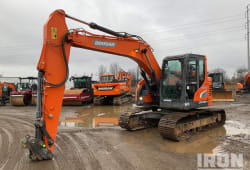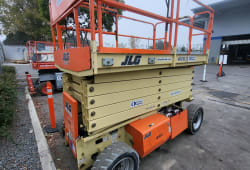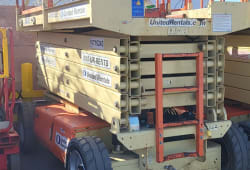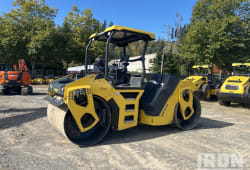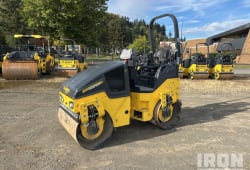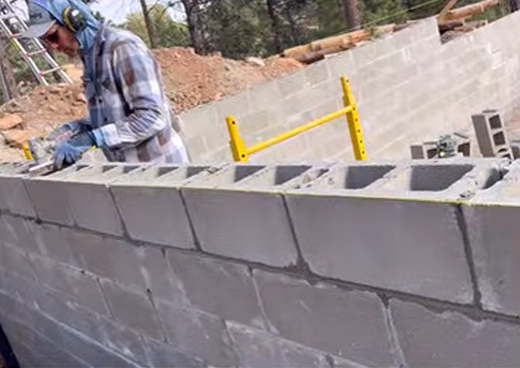Important Things You Need to Know on How to Become a Construction Worker
10 Min read
)
May 21, 2024
Becoming a construction worker opens up a world of opportunities for a dynamic and fulfilling career, offering the unique chance to engage in diverse projects that are crucial for building and maintaining infrastructures, such as homes, skyscrapers, and bridges. The salary range typically falls between $33,810 and $42,990 per year, with some workers earning as low as $14,869 and as high as $270,221 depending on their specific circumstances and experience levels.
Those interested in this field must follow a systematic approach to career development, which includes obtaining formal education and training, participating in apprenticeships, gaining hands-on experience, and continually updating skills to keep pace with industry advancements. This comprehensive approach ensures individuals are well-prepared to thrive in the evolving construction industry, taking on roles from basic site tasks to management and ownership positions.
Here are the important things you need to know in becoming a construction worker:
1. Understanding the Role and Responsibilities
Construction workers are integral to the execution of architectural plans, translating blueprints into physical structures. This role requires not only robust physical health to handle tasks like lifting heavy materials or operating large machinery but also mental acuity to follow complex instructions and maintain high safety standards. Workers often need to adapt to varied and challenging environments, from high-rise buildings to underground pipelines, each with its own set of hazards such as heights, confined spaces, and exposure to potentially harmful materials. Mastery of diverse skills and stringent adherence to safety protocols are therefore paramount.
2. Educational Foundations
Entering the construction field typically requires at least a high school diploma, but additional educational qualifications can significantly enhance career prospects. Understanding mathematical concepts is crucial for measuring, scaling, and interpreting plans, while basic sciences like physics are important for understanding material properties and construction techniques. Courses in technical drawing and architectural design offered by vocational schools or community colleges can provide a competitive edge, equipping aspiring construction workers with a deeper understanding of the structural elements they will encounter on the job.
3. Vocational Training and Apprenticeships
Structured vocational programs are tailored to impart specialized construction knowledge, including carpentry, masonry, electrical work, and plumbing. These programs blend classroom learning with lab and shop classes where students can practice skills in a controlled environment. Apprenticeships are particularly beneficial, offering the chance to earn while learning through hands-on work under the supervision of seasoned professionals. This real-world training is critical for gaining the nuanced skills and tacit knowledge that are essential for quality craftsmanship in construction.
4. Gaining Practical Experience
Early career stages typically involve working under more experienced colleagues, where newcomers can observe and learn the nuances of construction work. Tasks might include preparing sites, handling tools and materials, assisting with assembly, and learning to operate machinery under supervision. This period is crucial for building foundational skills and understanding the workflow of a construction project, including how to manage time efficiently, coordinate tasks with others, and handle unexpected challenges that arise during construction.
5. Safety Training and Certifications
Given the inherent risks of construction work, comprehensive safety training is a must. This includes learning to use personal protective equipment, understanding the regulations surrounding construction work, and being trained in emergency procedures. Workers often need certifications in health and safety standards like those offered by OSHA, which teach hazard recognition and prevention strategies. Additional certifications, such as those for operating specific machinery or handling hazardous materials, can further enhance a worker’s qualifications and readiness to handle more complex tasks.
6. Professional Certification and Licensing
Professional advancement often requires obtaining certifications or licenses, especially in specialized trades. These credentials are legal requirements in many jurisdictions for those who wish to independently contract work or perform certain types of tasks. The certification process typically involves passing examinations that test a candidate’s knowledge and skills, ensuring they meet industry standards for both safety and quality.
7. Developing Key Skills
Top construction workers are known for their physical endurance, dexterity, and precision. However, soft skills such as effective communication, teamwork, and problem-solving are equally important. Construction projects are collaborative efforts, and being able to work well in a team, communicate issues and progress clearly, and lead when necessary are critical for career progression. Additionally, adaptability is essential as construction technology and techniques evolve.
Some key skills are:
Physical Strength and Stamina:
Construction work is physically demanding. Workers often need to lift heavy materials and equipment, requiring strong physical health and endurance. Stamina is equally important as construction workers typically spend long hours on their feet, often in harsh weather conditions. The ability to sustain physical activity throughout the day without diminishing productivity is crucial.
Excellent Vision and Depth Perception:
Precision is key in construction work. Good vision and depth perception are vital for tasks such as reading detailed plans, measuring materials correctly, and aligning structures accurately. These skills help ensure safety and efficiency, reducing the likelihood of errors that could lead to accidents or require costly corrections.
Proficiency in Math and Measurements:
Basic math skills are fundamental in construction for a variety of tasks, from calculating areas and volumes to setting out building projects and converting measurements. Understanding ratios is also essential for scaling blueprints into practical, buildable projects and for maintaining the aesthetic and structural integrity of a design.
Coordination and Manual Dexterity:
Construction tasks often require the simultaneous use of hands and eyes. Manual dexterity aids in the handling of tools and materials, while coordination is crucial for tasks that require precise timing and movement, such as operating heavy machinery or assembling delicate components.
Detail-Oriented:
Attention to detail ensures that construction workers can follow complex instructions, adhere to safety protocols, and meet construction standards. It involves checking and rechecking work at various stages of a project, which is essential for achieving the desired quality and for the structural integrity of the construction.
Building and Mechanical Knowledge:
Understanding the mechanics of building materials, tools, and equipment is fundamental. This knowledge allows workers to choose the best tools and methods for a particular task, troubleshoot issues, and perform maintenance or minor repairs on equipment, which can improve job efficiency and safety.
Teamwork:
Construction projects typically involve a variety of professionals and laborers working together towards a common goal. Skills in teamwork involve communication, the ability to share responsibilities, and collaborative problem-solving. Working effectively in a team ensures that projects are completed efficiently, safely, and to the satisfaction of all stakeholders involved.
8. Networking and Career Building
Successful careers in construction are often bolstered by strong professional networks. Attending industry events, joining professional organizations, and maintaining active engagement with past and present colleagues can open doors to new opportunities and collaborations. Networking is not just about finding new jobs; it’s also about exchanging knowledge, staying abreast of industry trends, and building a reputation as a reliable professional.
9. Advancement Opportunities
With experience, construction workers can move into more complex and higher-paying roles such as project management, quality assurance, or safety analysis. These positions involve not just oversight of construction tasks but also planning, budgeting, and compliance—requiring a solid understanding of both the technical and administrative aspects of construction projects. Leadership roles also often necessitate additional credentials, such as a degree in construction management or certification in project management.
10. Continuing Education and Staying Informed
The field of construction is continually evolving with new technologies like building information modeling (BIM) and green construction practices. Keeping up with these changes through continuing education courses, workshops, and certification programs is essential for maintaining a competitive edge. Lifelong learning is key to adapting to new methods and technologies that can improve efficiency, sustainability, and safety in construction practices.
Where Can You Apply?
If you're looking to start or advance your career as a construction worker, there are several pathways and resources you can explore.
Job Boards and Websites
Online job boards are a great place to start your search. These platforms list numerous job openings in the construction industry.
Indeed: One of the largest job boards that lists construction worker jobs across various locations. You can filter by job type, location, and experience level.
Monster: Another popular job board where you can find numerous construction job listings.
CareerBuilder: Offers a wide range of construction job listings and allows you to upload your resume for employers to find.
SimplyHired: Lists various construction jobs and allows you to filter by location, salary, and job type.
ConstructionJobs.com: A job board specifically for the construction industry. ConstructionJobs.com
Trade Unions and Apprenticeship Programs
Joining a trade union or apprenticeship program can provide training, job placement assistance, and career advancement opportunities.
International Union of Operating Engineers (IUOE): Offers apprenticeship programs and job placement. IUOE
Laborers' International Union of North America (LiUNA): Provides training and job opportunities. LiUNA
National Apprenticeship Service (UK): Provides information on apprenticeship opportunities in construction. National Apprenticeship Service
Local Workforce Agencies
Local government workforce agencies often have job listings and can help with job placement and training programs.
American Job Center: Offers job search assistance and training programs. American Job Center
UK Jobcentre Plus: Provides job search and application support. Jobcentre Plus
Networking and Referrals
Networking is a powerful tool in the construction industry. Attend industry events, join professional associations, and connect with other professionals on platforms like LinkedIn.
LinkedIn: Join groups related to construction and connect with professionals in the industry. LinkedIn
Construction Industry Events: Attend trade shows, conferences, and other industry events to network with potential employers.
Recruitment Agencies
Recruitment agencies can help match you with employers looking for construction workers.
Hays Recruitment: Specializes in construction recruitment.
Randstad: Provides staffing services for the construction industry.
Compensation and Career Prospects for Construction Laborers
The average annual salary for construction laborers is approximately $73,885, although this can vary based on factors like experience, skill level, and geographic region. Salary variations are often significant between different states and cities due to local economic conditions and the demand for construction services.
According to the U.S. Bureau of Labor Statistics (BLS), the employment outlook for construction laborers is expected to grow by 5% from 2019 to 2029, which is slightly above the average growth rate of 4% projected for all occupations. This growth is anticipated as a result of increased construction activity, particularly in infrastructure projects involving the repair and construction of roads and bridges. Furthermore, the rise in the use of prefabricated building components, such as modular rooms and panels that are manufactured offsite and assembled onsite, is expected to further stimulate demand for skilled construction laborers. This trend underscores the industry's evolving dynamics and the ongoing need for laborers adept at working with both traditional and innovative construction methods.

Samir Shah is the Co-Founder and Chief Product Officer of Boom & Bucket, where he leads the development of innovative solutions for buying and selling heavy equipment. With a background in engineering, product development, and business strategy, Samir has a track record of taking companies from concept to market success. Previously, he was the Head of Cat Digital Labs at Caterpillar, overseeing digital initiatives and product launches. He holds degrees from MIT Sloan and Carnegie Mellon, and he is passionate about tackling big challenges in underserved industries.


